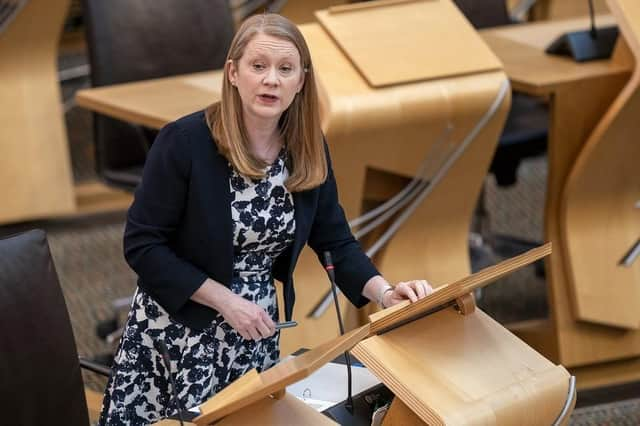Shirley-Anne Somerville: Why it is time to help Ukrainian refugees settle in Scotland


Today, Ukrainians around the world are marking Defenders Day to honour veterans and fallen members of their armed forces.
At 9am the squares and streets of Ukrainian cities will fall silent for one minute in tribute to those who have lost their lives in the fight for Ukraine’s freedom.
Advertisement
Hide AdAdvertisement
Hide AdIt is now more than 18 months since Russia launched its illegal full-scale invasion of Ukraine, devastating lives and forcing millions of people to leave their homes. The speed and scale of the displacement of Ukrainians across Europe was unprecedented.
Scotland responded swiftly to the humanitarian crisis to provide immediate accommodation and access to essential support. So far, Scotland has offered a place of sanctuary to more than 25,600 displaced people from Ukraine – more than 20,400 of these through the Scottish Government's Super Sponsor scheme.
People who arrived in the weeks and months following the war’s outbreak have now started to rebuild their lives here, with Ukrainian communities forming in towns, cities and rural areas. Many of them have found employment and more than 3,000 Ukrainian children are enrolled in Scottish schools.
As displaced people continue to settle into life here, we are adjusting our approach to make sure our support for Ukrainians reflects these circumstances.
This week, we have published our Warm Scots Future paper. Developed in close partnership with COSLA and the Scottish Refugee Council, this new strategy outlines how we will help Ukrainians settle into life in Scotland for the longer term.
Our approach to integration keeps the human rights of displaced people at its heart. This includes practical support such as help to find employment, learn English and access benefits. It also includes wider support for wellbeing, ensuring that Ukrainian people can build and become part of new communities, and support to access the NHS and mental health services.
To help this work, we are providing more than £1.5 million to third sector organisations across Scotland. That includes more than £1m for the Scottish Refugee Council to help provide Ukrainians with advice and support, including through a helpline and information sessions. It will also give people a platform to tell their stories, connect with those with shared experiences and contribute to the development of policies.
Another key part of our strategy is helping more people access sustainable housing. While welcome accommodation played an important role in making sure we could offer people an immediate place to stay, it is not a long-term solution. Having a settled place to call home helps provide security for displaced people, supporting them to integrate into communities.
Advertisement
Hide AdAdvertisement
Hide AdOne way we’re doing this is through our £50m Ukraine Longer Term Resettlement Fund, which is funding councils and housing associations to refurbish empty, disused homes for Ukrainians to live in.
Sixteen of these projects have been approved so far, bringing 1,200 social rented homes across Scotland back into use, with more projects in the pipeline. When these homes are no longer needed by Ukrainians, many of them will be retained as part of Scotland’s social housing stock.
Councils will also receive £3.2m to support staffing of local resettlement teams. This is alongside £30m being distributed to councils to support Ukrainians into their own homes and prevent homelessness, including through private and social renting.
While the Scottish Government wants Scotland to be home to Ukrainians for as long as they need it, I know that many people are worried about what will happen when their visas expire. Visas issued by the Home Office allow displaced Ukrainian people to stay in the UK for three years from the date of issue, but the UK Government has not yet provided clarity on what will happen when that period comes to an end, making it difficult for Ukrainians to plan for the future.
There need to be clear routes to settlement in Scotland for those who wish to stay here, and our new strategy commits to pressing the UK Government for urgent answers on options and support available.
On Wednesday, I launched this plan at the Association of Ukrainians in Great Britain’s Edinburgh branch – a hub for displaced people in the city. I joined one of their arts and wellbeing workshops, where a group of Ukrainians gather each week to be creative and meet friends with shared experiences.
Many of the women I met have partners, family and friends who are still in Ukraine. Workshops like this bring them together – helping take their minds off the anxiety about those at home, and when the conflict will end. They told me how much they appreciate the warm welcome they have received in Scotland, and I hope this plan provides reassurance that this support will continue for the longer term.
The Ukrainian Consul also told me about how those on Ukraine’s front line find comfort in the knowledge that their loved ones are being supported in a safe place. Knowing their wives, sisters and children have been able to rebuild their lives away from the brutality of war and the threat of Russian missiles is helping give soldiers the strength to keep fighting for their country.
Advertisement
Hide AdAdvertisement
Hide AdThe illegal war against Ukraine is horrific and unjust. This Defenders Day, we are reaffirming our solidarity with Ukraine. Once it is safe to do so, we want Ukrainians living in Scotland to have the choice of staying here or returning home. However, for as long as that is not possible, we will continue to do all we can to help them to feel safe, secure and settled in Scotland.
Shirley-Anne Somerville is the Scottish Government’s Social Justice Secretary
Comments
Want to join the conversation? Please or to comment on this article.